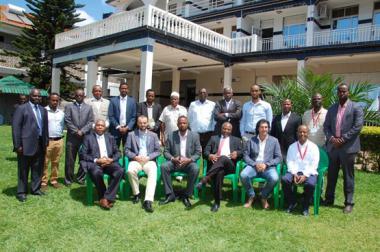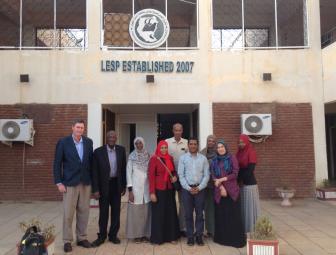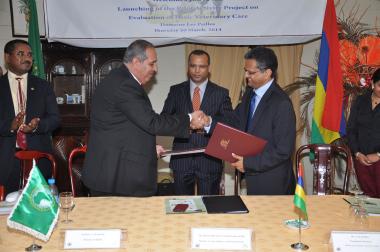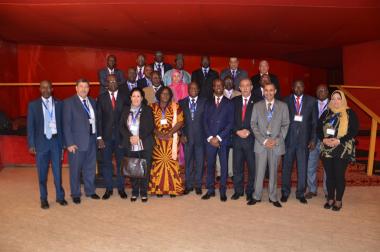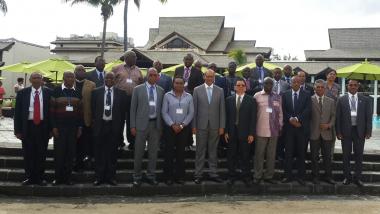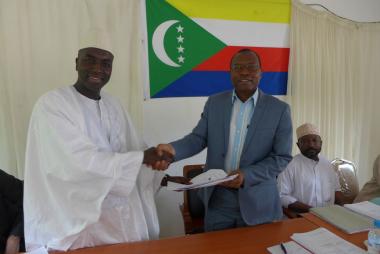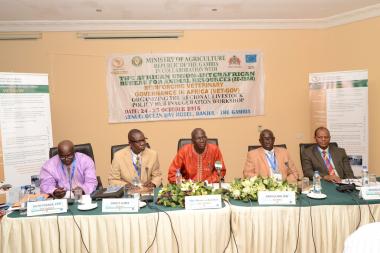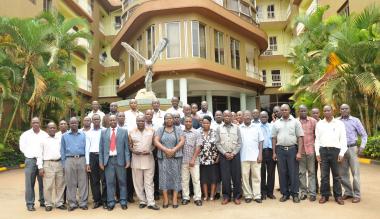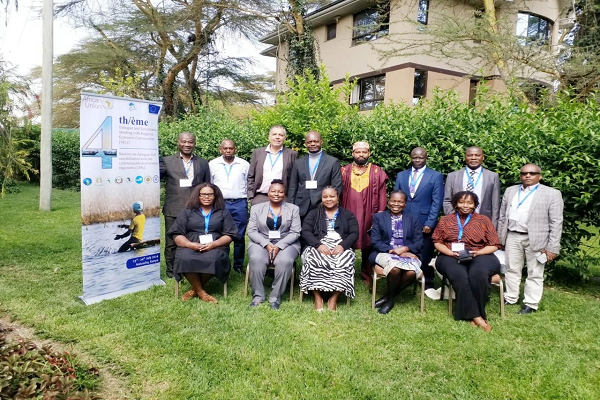
From July 23-24, 2024, Naivasha, Kenya, AU-IBAR and AUDA-NEPAD are jointly hosting the Fourth Annual Dialogue with Regional Economic Communities (RECs) on the implementation of the Fisheries Governance Project Phase 2 (FISHGOV2). In a speech delivered on behalf of AU-IBAR’s Director, Dr. Huyam Salih, Mrs. Hellen Gaudenna praised the European Union for its support in fisheries and aquaculture development. The meeting aims to share progress in technical implementation, recommendations, and emerging issues. The RECs were commended for their collaboration with AU-IBAR and AUDA-NEPAD, contributing to the project's achievements. Regular dialogue meetings are crucial for updating RECs on project activities, challenges, and perspectives. The meeting highlights the RECs' commitment to the African Union development agenda and the European Union's unwavering support for continental fisheries and aquaculture development.
Discussions have focused on the FISHGOV2 Project's 2024 achievements. The project, which aims at promoting sustainable fisheries and aquaculture policies across Africa, has made significant strides this year. Notable progress has been achieved across various strategic objectives, and this meeting showcased these advancements while highlighting emerging issues.
One of the primary strategic objectives of FISHGOV2 is to ensure that African Union (AU) decisions on sustainable fisheries and aquaculture policies are evidence-based. This year, the project successfully centralized information and research related to fisheries and aquaculture within AU institutions. This centralized repository serves as a vital resource for stakeholders, providing access to quality knowledge products. Efforts to prepare and present positions, advocacy papers, and policy briefs on pertinent issues have also been fruitful.
A significant milestone was the capacity building of AU Member States (MS) on database use, data inputting, retrieval, and transmission of fisheries and aquaculture data. An online capacity-building session for AFADATA data operators on data storage, retrieval, and transmission is scheduled for August 6-8, 2024. Additionally, the African Fisheries Reform Mechanism (AFRM) Small-Scale Fisheries (SSF) and Aquaculture Working Groups (WGs) have developed valuable knowledge products, further enhanced by an expert consultative workshop for AFRM.
The project has also focused on reviewing, rationalizing, and operationalizing existing platforms and networks for effective stakeholder participation in policy development and implementation. The rationalization of these platforms ensures institutional anchorage at relevant levels, enhancing their capacities for implementing identified activities and pilot projects. Notably, the AFRIFISH-Net Bureau participated in the Small Scale Fisheries pre-summit meeting in Tanzania, where they were sensitized on the socio-economic importance of fisheries and the blue economy. The second General Assembly meeting of the African Network of Aquaculture Centres (ANAF) was organized, reconstituting its Bureau and defining elements of the ANAF Strategic Plan. The first ANAF Bureau meeting followed, where a work plan was developed.
In addition to these achievements, the FISHGOV2 Project has put in place a robust reporting system for implementing the Policy Framework and Reform Strategy for Fisheries and Aquaculture in Africa (PFRS). Indicators to monitor PFRS implementation, aligned with the Malabo goals, were developed in 2022 and are currently being transformed into a comprehensive handbook. The University of Rhodes and the University of Ibadan have been recruited to develop a performance snapshot based on these indicators, with the activity ongoing.
Engagement with non-fisheries and aquaculture actors has been another key achievement. A second meeting held in Dar Es Salaam in June involved participants from various institutions, enhancing awareness of the socio-economic importance of fisheries, aquaculture, and the blue economy. The project has also been proactive in advocacy, drafting and disseminating materials in different languages, and developing dedicated fisheries and aquaculture portals. Ongoing efforts include the identification of national IT experts to develop or strengthen existing portals within five Regional Economic Communities (RECs) and five Regional Fisheries Bodies (RFBs).
The project has made significant progress in enhancing regional collaboration and integration regarding shared fisheries and aquaculture resources management. Regular information exchange among regional organizations and identifying mechanisms to strengthen linkages between fisheries and environmental organizations are key achievements. An APRIFAAS meeting is being organized for October to further these efforts.
Capacity building for member states, RECs, and RFBs to develop realistic, sustainable fisheries and aquaculture policies in coherence with the PFRS has been strengthened. The project has supported countries like the Democratic Republic of Congo and Liberia in reviewing their national policies for alignment with PFRS. Preparations for stakeholder consultative workshops in multiple AU member states are ongoing, alongside the identification of national consultants and conference facilities.
At the international level, the FISHGOV2 Project has increased the capacities of AU Member States, including Small Island Developing States (SIDS), in international negotiations. A third SIDS meeting was organized in Rome during the FAO's 36th Session of the Committee on Fisheries (COFI), where specific needs, such as climate change and marine pollution, were identified and incorporated into strategic positions. The recruitment process for a Center of Excellence (COE) is ongoing, and training for negotiators was conducted in August last year.
Efforts to encourage and facilitate the domestication of global instruments and initiatives at continental, regional, and national levels have also been noteworthy. Mechanisms for regular updates on the state of ratification and domestication have been established, and support for dialogues and sensitization at REC levels has been provided. A biennial forum was operationalized, and the status of global instrument implementation or ratification was determined.
While challenges persist, including delays in key studies, the achievements of the FISHGOV2 Project in 2024 reflect a strong commitment to promoting sustainable fisheries and aquaculture policies in Africa. These efforts are ensuring that the continent's marine, coastal, and freshwater ecosystems remain healthy and resilient in the face of climate change.

